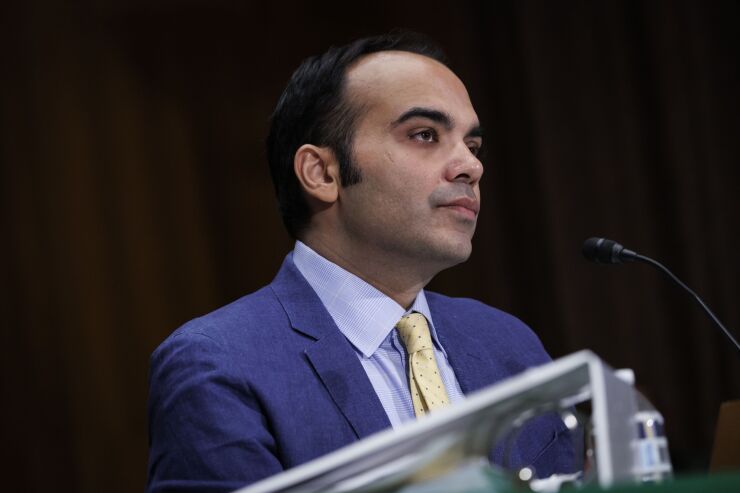
Republican lawmakers in the House Financial Services Committee turned the rhetorical screws on Consumer Financial Protection Bureau Director Rohit Chopra Wednesday, accusing him of pursuing regulatory objectives in order to help President Biden win reelection and failing to take industry concerns into account with his agency's proposals.
At the outset of what was to be a four-hour hearing Wednesday, Rep. Andy Barr, R-Ky., set the tone of the hearing by calling the CFPB "an appendage of President Biden's reelection campaign."
Barr, who led the hearing in the absence of committee chairman Rep. Patrick McHenry, R-N.C., lambasted Chopra for labeling all fees "abusive," and for targeting so-called
"You use compliance bulletin, circulars and advisory opinions to sow doubt and confusion in the marketplace," said Barr. "You vilify an entire industry simply because they are politically unsavory in your opinion. The practice of name-and-shame first, verify later, isn't consumer protection, it's McCarthyism."
Rep. Blaine Luetkemeyer, R-Mo., took up the same line of questioning, asking Chopra whether companies are required by law to abide by pronouncements made in blog posts and speeches.
"Since public statements are not rulemakings or official actions, and the guidance you issue is not legally binding, are financial institutions and firms within their rights if they do not adhere to your proclamations?" Luetkemeyer asked. "This is very concerning because you turn around and you threaten different entities all the time. You've become the greatest extortionist in the history of this country."
The grandstanding became too much for Rep. Juan Vargas, D-Calif., who complained that the committee's chair failed to intervene to stop the name-calling.
"The hyperbole today is actually rather remarkable," said Vargas. "Are you the greatest extortionist? Is that true?"
"Obviously that's not true," Chopra replied.
"I wanted to give you the opportunity to react to that," Vargas said. "Are you beating the stuffing out of the free enterprise system? The accusation was of McCarthyism. You heard it, I heard and it wasn't defined. I hope that we're a little more careful with our language around here when we accuse people of McCarthyism, extortionism and all these other things."
CFPB hearings tend to devolve into unproductive partisan brinkmanship, in part, because of the hearing format, in which each lawmaker has five minutes to ask questions.
Many Democrats on the committee lobbed softball questions that allowed Chopra to take the floor. On credit card late fees, Chopra sought to explain that Congress, in passing the Credit Card Accountability Responsibility and Disclosure Act of 2009, known as the CARD Act, prohibited unreasonable and disproportionate penalty fees. Credit card issuers can charge more than the $8 late fee, known as a safe harbor, in order to recoup costs.

"Lenders should want their customers to pay back and pay on time," Chopra said. "We don't want a system where people are happy when someone doesn't pay on time, or when they've missed it by a day."
Rep. Bryan Steil, R-Wis., questioned the tradeoffs associated with lower late fees.
"Nobody likes paying late fees and you don't want people to get into financial distress," Steil said. "You don't think that this will lead to more expensive credit?"
Chopra said he expects competition will lead some consumers to switch credit card providers.
"What I think will happen is that rather than a business model built on penalties, they'll compete just like other banks and small banks do that offer credit cards, which is really an up front or an annual fee or interest rates and others, I think the competitive process will work better," Chopra said.
Lawmakers also criticized Chopra for not doing more to promote financial literacy. Rep. Young Kim, R-Calif., said the CFPB should use the roughly $500 million in its civil money penalty fund to promote financial education while others suggested the money should also be used to prevent frauds and scams. Lawmakers on both sides of the aisle asked Chopra about privacy and data protection issues as the CFPB.
Rep. Stephen F. Lynch, D-Mass., said his constituents are complaining about chatbots and other forms of artificial intelligence used by banks and financial firms to resolve problems.
"I'm just wondering, are we meeting our obligations to consumers when we allow banks to put a chatbot interface between them?" Lynch asked.
Chopra said that the CFPB is reminding institutions that "they still have to adhere to important legal protections and make sure that they're not violating privacy" laws.
Republican lawmakers also questioned Chopra about a data breach by a CFPB employee in February. Rep. Bill Huizenga, R-Mich., said the bureau's staff did not answer questions about the breach.
"Your staff couldn't give basic answers and sometimes there wasn't any answer at all," Huizenga said. "I'm sorry to be suspicious here, but I know how D.C. works and it makes me wonder, once again, your sort of dismissive attitude towards Congress that has come across in previous hearings and previous interactions."
Several Republican lawmakers told Chopra that they consider the CFPB to be unconstitutional, even as Democrats defended the agency. The CFPB faces
Committee members asked Chopra about a wide range of consumer topics, from credit repair scams to complaints about cryptocurrencies, for-profit debt relief companies to tenant screening firms.
Rep. Ann Wagner, R-Missouri, took Chopra to task for not publicly disclosing his calendar on the CFPB's website.
"Would you say that a six-month hiatus for public disclosure is your way of showing commitment to transparency?" she asked. "I'm seeing an extremely troublesome theme here."





